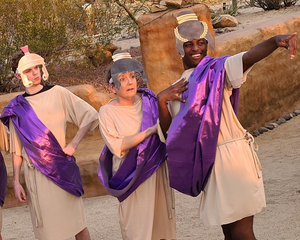Review: MILES GLORIOSUS at Joshua Tree Summer Theatre
Roman slapstick is a joy under the desert sky

Joshua Tree's Summer Theatre Under the Stars is currently playing their third offering, Miles Gloriosus, and it's good enough that it makes me sad that there's only one more show in the season. I truly hope this becomes an annual event at the amazing Wind Walkers Medicine Wheel theatre-in-the-round.
Miles Gloriosus, or the "braggart soldier," is a stock character in Roman comedies. Much as we know the backstory and quirks of characters in TV sitcoms, Roman playwrights used shorthand with familiar characters appearing in numerous plays. Miles is always a self-centered buffoon, Senex is a lecherous old man, and typically the servants kowtow to their masters, but in asides to the audience, reveal that they are actually the wisest ones onstage.
Writer/director Wendy Cohen has taken advantage of these and many other characteristics of the period in what she describes as a work "very loosely adapted from Plautus." Plautus was the most prolific comedic writer of his age (second century BC), and seems to have written at least 130 plays! Eat your heart out, Neil Simon.
The plays were typically presented with four actors wearing masks to indicate which character they were, allowing the four thespians to portray a battery of characters. Cohen has emulated that technique by assembling four actors - Adan Bosworth, Lloyd Schlitt, Malcolm Stanley-Wolfe, and Cohen herself - and decking them out with cardboard masks with character names written on them. Rather than full-faced masks (the original Roman ones also functioned as megaphones), she has used cutouts of hair, helmets, and occasional beards and attached them to the actors' heads with bands of elastic. This works when the actors are facing you, but with a theatre in the round, you've got 50/50 odds at any given moment of seeing a face.
Cohen's script stays true to the Roman playwright's values. There are lots of puns, sentences will endless alliterations, and some bawdy bits such as "I'm excited to see her. (looking down) I mean, I'm really EXCITED!" It would be a mistake to treat this material with reverence. In the original productions, actors would sometimes sport a stuffed cloth phallus that hung down to their knees.
Aidan Bosworth and Malcolm Stanley-Wolfe delivered the top two performances. They each had distinct characterizations for each character they played whether male, female, old or young, and both worked with amazing energy. Wendy Cohen had some of the funniest onstage moments, though she occasionally tangled up which character she was referring to. It was a gamble to write, direct, and also appear in the piece and I kept imaging that a part of her brain was focused on what the other actors were doing. First-timer Lloyd Schlitt was a bit out of his league with playing so many characters, moving so quickly, and remembering so many lines. Unfortunately, he carried a script through the majority of the show and though it was more for confidence than actual need, it certainly distracted.
I especially liked the director's use of frenetic movement. Characters rarely stood in one place for more than a few seconds, which certainly helps in theatre-in-the-round, and some of the best moments were when some characters exited at one end of the stage while at virtually the same moment, new ones came on from the opposite side. It kept the audience active, turning their heads like at a tennis match, and nailed the sense of comedy.
I have enjoyed coming back every few weeks to this amazing little gathering space just outside of Joshua Tree to be presented with original, experimental works by local artists. Each show has run 60 - 75 minutes and was based on a historical period. The first was a wild west show from around the 19th century. Next came Shakespeare in Review, mid-16th century. The current Roman comedy takes its style from around 150 BC, and the closing piece, Eyeless in Colonus, is a modern take on a Greek tragedy, the original of which was around 400 BC. Eyeless in Colonus is written by Bruce Bonafede, a local playwright whose work has been performed around the world, and directed by Howard Shangraw. It plays August 6 - 15. Tickets and further information are available at www.windwalkersmedicinewheel.com.
Reader Reviews
Videos

